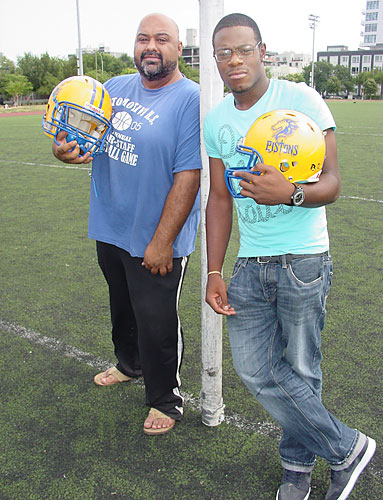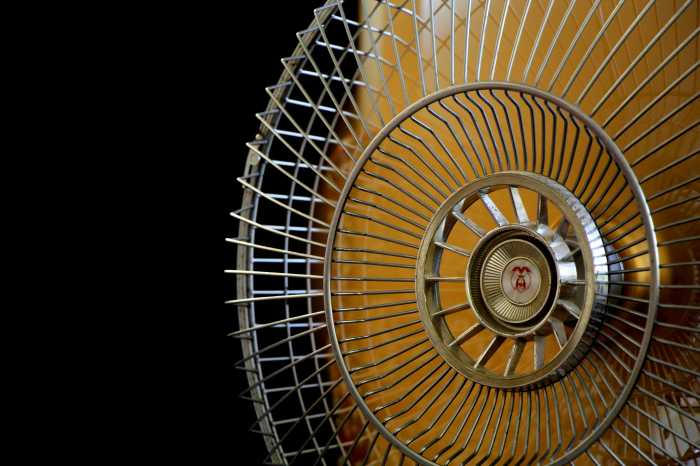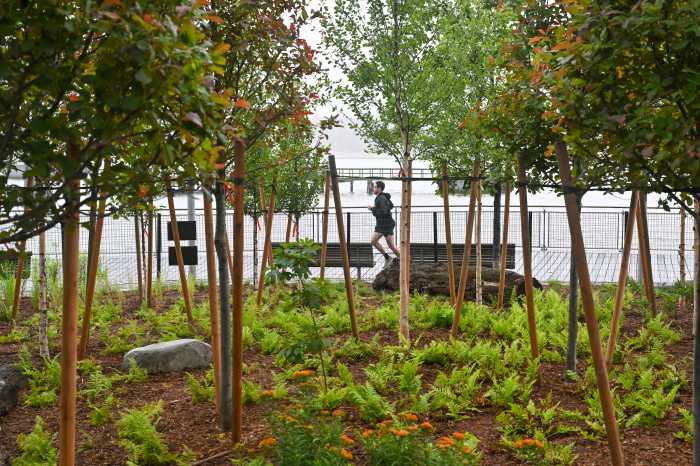One of Brooklyn’s best high school football teams is forced to play its home games at a rival high school’s field because the city and the school’s league won’t let the team play in McCarren Park across the street.
Automotive HS has not played a true home game — or heard the roar of a big hometown crowd — in its seven-year existence, even though there is a regulation-size football field in the adjacent park.
Instead, the team and its few diehards must travel 20 blocks to the Grand Street Campus, home to the Pistons’ bitter rivals, the Wolves.
“It doesn’t make us feel at home,” said former Pistons linebacker and tight end Joshua Smalls, who graduated this year. “We have less time to warm up and get prepared for the game. It’s definitely a disadvantage not to play close to home.”
Automotive coach Haseeb Khawaja says he’s frustrated by the obstacles his team must overcome beyond what happens on the gridiron. For example, because he lacks a home field, he can’t film his team’s games because he has no access to Grand Street Campus facilities. And even though the Pistons are the “home team” at the Grand Street Campus, the Automotive players lose valuable time in transit.
And consider this: The team’s “homecoming game” is on Sept. 11 — a mile from home.
The marching band even has to shell out for its own Metrocards to get to the Grand Street Campus.
Khawaja understands that other teams in the city share field space, but sees no substantial reason why his team can’t use McCarren Park’s synthetic field, which even has goalposts.
“Home-field advantage is definitely an intangible,” said Khawaja. “It makes the difference between championship teams and those who can’t get over the hump.”
That said, it didn’t make much of a difference last year, as Automotive went undefeated.
Government agencies are pointing fingers over why the school cannot play in the park. A Public School Athletic League official declined to comment, referring the matter to a Department of Education spokeswoman who said the field was “not conducive for football games” because of its lack of fencing.
“It creates too many obstacles and we don’t want to have any kind of furious accidents there,” said the spokeswoman, Marge Feinberg.
A Parks Department spokesman added that the athletic league’s rules state that the games must be played in places that are not open to the public. Four years ago, the Parks Department actually issued permits for two Pistons games in McCarren Park, but the city reversed course, citing security concerns.
Despite this disadvantage, the Pistons have turned its program around, going from an ugly 0-10 season four years ago to coming within one point of winning the championship in its division against South Bronx last fall.
The Pistons do have access to McCarren Park’s track for its practices, but for only one or two days a week due to high demand for space from other park users. For the other days, the Pistons play on the dusty, scuffed-up baseball fields and even the concrete softball courts behind the school. On those days, tackling of any kind is prohibited.
“We bring a lot of Band-Aids, iodine and disinfectants for cuts and bruises when we play on the baseball fields,” said Khawaja.
Khawaja believes the city is unwilling to let his team play in McCarren because of “fear of the unknown” and thinks that games could be allowed on the track with minimal disruption.
“We have enough kids and equipment, but now we’re turning our attention to the field,” said Khawaja. “Unless PSAL changes its decision, or the Parks Department puts up fencing, it’s really out of our control.”

























